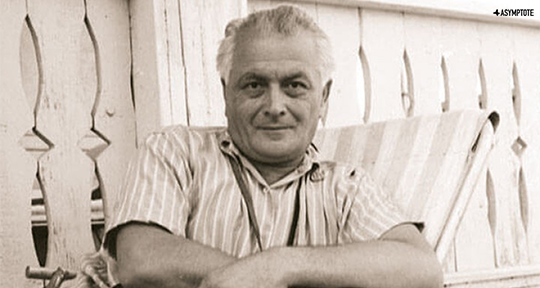Though Soviet literature has been studied and discussed on a global scale, the texts of Uzbekistan during that heated, tumultuous era have rarely reached beyond its language. In a new translation by Christopher Fort, however, one of the titans of Soviet Uzbek letters is making his English-language debut. Abdulla Qahhor’s autobiography, Tales from the Past, reveals the particular history of Soviet power in his country, as well as the sometimes tenuous boundary between the self and the Party line. In the following essay, Filip Noubel dives into the times and works of Qahhor, speaking with Fort to elucidate how this classic author should be read today.
In the anglophone world, Central Asia remains somewhat of a terra incognita on the map of literary traditions; thus, whenever a translation from the region does appear in English, it is something to celebrate. Today, there is reason to do so thanks to the efforts of Christopher Fort, a scholar of Uzbek literature and an assistant professor of general education at the American University of Central Asia. Fort has just published a partial translation of Tales from the Past, the literary autobiography of Abdullah Qahhor (1907-1968), arguably the greatest master of the Uzbek short story from the Soviet period. While the full translation will come out later next year, a large excerpt—including the foreword and the first chapter—is available to read online, providing a rare insight into Qahhor’s world and his role as a key public intellectual, navigating the political minefield of the Stalinist period and its aftermath. His other works include two novels: Mirage and The Lanterns of Qo‘shchinor.
Uzbek literature is a rich field encompassing different languages, alphabets, and traditions—one of which is the Soviet Uzbek literature from the 1920s to the 1980s, mostly written in Cyrillic Uzbek and Russian. The beginning and the end of this period can be characterized as times of exciting diversity, unlike its heavily censured middle period. To understand the twenties, it is necessary to go back to the late nineteenth century, when an innovative generation of intellectuals—the Jadids, who took their name from the concept of “usul-i-jadid,” or “the new method”—revolutionized the literary landscape of what was then Tsarist Turkestan, one of Russia’s latest conquests in Central Asia. By the early 1920s, this generation had created a golden age of Uzbek literature, which produced the first novels ever written in Uzbek, experimenting with various form and themes. However, the Stalinist purges of the 1930s, targeting independent intellectuals across the entire Soviet Union, put a brutal end to this period, sending many prominent writers to jail, camps, and eventually to their death.
After the thirties, a new generation of writers emerged in Uzbekistan, having pledged full loyalty to the demands of political correctness and socialist realism—the Moscow-imposed model of writing fiction. Abdulla Qahhor, G‘afur G‘ulom, and Oybek were among the most famous names. However, as Fort himself explains, this generation is more linked with its predecessors than it might appear: “These authors later demonstrate some regret over their participation in Stalin’s purges of their forefathers. While relatively quiet in the 1930s, Qahhor in particular became a major voice of opposition in the Soviet Uzbek literary establishment of the 1950s, advocating for less oversight from the Writers’ Union [the powerful institution that dictated the correct political line for writers in every Soviet Republic]. He also produced the only piece of Uzbek literature, of which I’m aware, written for the drawer. His Earthquake, written in the 1960s but first published in 1987, illustrates some of the terror of the purges and, depending on how one reads it, some guilt for his complicity in them.” READ MORE…

